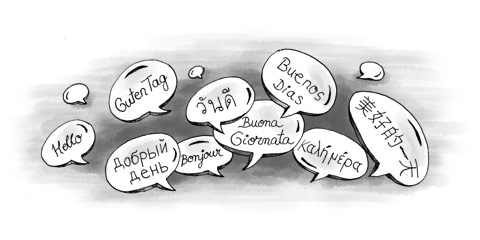Ireland’s second official language, English, on the other hand, is spoken by almost everyone and in most situations it isn’t necessary to know a word of Gaelic whereas proficiency in English is virtually essential, particularly if you have a job which requires a lot of contact with others or involves speaking on the telephone or dealing with other foreigners who may speak their own ‘dialect’ of English.
It’s especially important for students to have a high standard of English, as they must be able to follow lectures and take part in discussions in the course of their studies. This may also require a much wider and more technical or specialised vocabulary. For this reason, most universities and colleges won’t accept students who aren’t fluent in English and many require a formal qualification, e.g. a pass at GCSE or the Cambridge proficiency examination. Prospective students can assess their English fluency by taking the English Language Testing Service (ELTS) test at British Council offices in over 80 countries.
Whether you speak British or American English (or some other form) is usually irrelevant, although some Irish people will have difficulty understanding strong non-Irish accents and you may find Irish pronunciation takes some getting used to.
There are also one or two other words and phrases deriving from Gaelic with which you’ll need to be familiar. Most important perhaps is the word garda (pronounced ‘gorda’), which is what a policeman is called (the police are collectively called the Garda Síochána, although this is often abbreviated to Garda, and policemen are gardaí, pronounced ‘gordee’). Then there are words such as ben for mountain, glen for valley, knock (or cnoc) for hill, lough for lake or inlet and strand for beach. Mór (or more) means big, wee is little, a wean (pronounced ‘wain’) is a child. If your car won’t go, it’s said to be banjaxed and if it’s mizzlin (as it often is in Ireland) it’s raining gently.
Other words that sound familiar are used in strange contexts: if something is clever it fits well; a chick isn’t a young woman but a child, who, if he is naughty, is said to be bold; if someone is brave he is a worthy sort, but if he is a caution he is a devil-may-care fellow; to be cut is to be insulted, to be destroyed is to be exhausted, and to be scalded is to be vexed; if you’re feeling unwell, you might be said to look well shook; fairly means excellently; fierce and terrible mean extremely; a skiff is a shower of rain; and if it’s soft – you’ve guessed it – it’s raining! If you’re a homeowner, you’ll be known as a blow-in, if you’re in fiddler’s green, you’re in a mess, and if an Irishman says to you, “I’m after meeting your wife,” he doesn’t mean he would like to meet her – he already has!
If you wish to improve your English before starting work or a course of study in Britain, there are English-language schools throughout the country where you can enrol in a full or part-time course lasting from a few weeks to a year.

